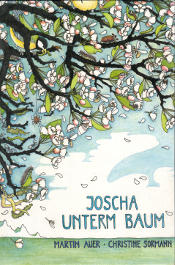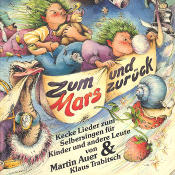Martin Auer: The Strange War, Stories for Peace Education

At Your Own Doorstep
Please share if you want to help to promote peace!
Original in English by Martin Auer
Reviewed by Sara Bernal Rutter
Bücher und CDs von Martin Auer

In meinem Haus in meinem Kopf
Gedichte für Kinder

Die Prinzessin mit dem Bart
 Joscha unterm Baum
Joscha unterm Baum

Was die alte Maiasaura erzählt

Die Erbsenprinzessin

Der wunderbare Zauberer von Oz - Hörbuch zum Download

Die Jagd nach dem Zauberstab, Roman für Kinder - Hörbuch zum Download
 Der seltsame Krieg
Der seltsame KriegGeschichten über Krieg und Frieden

Zum Mars und zurück - Lieder
 Lieblich klingt der Gartenschlauch - Lieder
Lieblich klingt der Gartenschlauch - Lieder

Lieschen Radieschen und andere komische Geschichten - CD
There was a town that suffered badly from traffic
jams. For some reason there were not many traffic lights, and one reason
for the constant jams was this: When drivers drove up to an
intersection and saw that the column of cars across the intersection
came to a stop, they would nonetheless try to press their car onto the
intersection, so they would not be blocked by the traffic coming from
the side when the column in front would move on. In this way of course
they blocked the traffic coming from the left and from the right. What
would happen further is hard to explain in words, a computer animation
could make this clear in a minute. Let's try it anyway: All the roads
from north to south were called streets, and all the roads going from
east to west were called avenues. Now let's say Mrs. Kumar is driving
along 5th Street going north and approaching the intersection of 5th
Street and Avenue D. She sees that traffic behind the intersection is
slowing down, but still she drives onto the intersection and has to stop
right there. In this way she blocks the traffic going east to west and
west to east on Avenue D. So it happens that Mrs. Miller, going west on
Avenue D drives onto the intersection with 4th Street, blocking the
traffic there, and Mrs. Szymanski, going east on Avenue D drives onto
the intersection with 6th Street, blocking the traffic there. Next the
intersections of 6th Street and Avenue C and 6th Street and Avenue E
will be blocked, as well as 4th Street and Avenue C and 4th Street and
Avenue E and so on … And the jam spreads across the whole town.
"This is war on our roads!" Mrs. Kumar used to sigh every
evening when she was driving home from work. One day Mrs. Kumar
remembered the saying: Peace begins at your own doorstep. She decided
not to press onto intersections any more. But when she stopped before an
intersection because the traffic behind it was stopping to let the cars
coming from the side pass, the drivers behind her would honk their
horns and even shake their fists at her. Because, of course, if she
would not press onto the intersection when it was possible for her to do
so, it might be quite a long time until the traffic coming from the
side would give her a chance to cross. But what was worse than other
drivers being mad at her was this: When she did not make use of every
possible advantage she arrived home about half an hour later than usual.
This made her sad because her family were waiting for her to cook
dinner and the children needed her to help them with their homework and
really the chores in the house were so many that Mrs. Kumar felt she
could not afford to lose this half hour. She felt it was her duty to her
family to drive home as fast as she could. So after some days she just
gave up and returned to driving like everybody else did.
What Mrs. Kumar did not know was this: Two weeks earlier Mrs.
Miller had had just the same thought. She also started to stop befor
intersections to make way for the cars coming from the right and the
left. She also got fists shaken at her and she also lost half an hour
that she felt she should devote to her own family. And so Mrs. Miller
had given up again just as Mrs. Kumar. And four weeks earlier Mrs.
Szymanski had had just the same experience. And she had also given up.
One Saturday afternoon Mrs. Kumar took her children to the
playground in the park. She sat on one of the benches and watched them
playing on the seesaw and the monkeybars. By chance Mrs. Miller and Mrs.
Szymanski came to sit on the same bench and the three ladies started
talking about the weather, the children, the cost of living and the
impossible traffic situation of the city.
"It is war on our roads!" sighed Mrs. Kumar.
"This city is a madhouse!" said Mrs. Miller.
"People are so selfish!" exclaimed Mrs. Szymanski.
At this point Mrs. Fukuda, who was sitting on the next bench,
bent over and said: "Excuse me for interfering, but I think that peace
begins at your own doorstep. I have decided that from now on I will not
drive onto intersections anymore. I think someone just has to start
doing the sensible thing."
So the three other ladies all at the same time excitedly began to tell Mrs. Fukuda about their experiences.
"It is hopeless!" sighed Mrs. Kumar.
"It is a tragedy!" cried Mrs. Miller.
"There is nothing that can be done!" exclaimed Mrs. Szymanski.
"But we have a duty towards our fellow humans!" said Mrs. Fukuda. "We cannot be so selfish!"
"Yes. But we also have a duty towards our families", said Mrs.
Kumar. "It is not selfishness that makes me drive as fast as I can. It
is the wish to be with my family! I know I should drive a little slower
so others can get home earlier. But what about my own family? It would
be unfair to them."
"It is tragic", said Mrs. Miller. "By driving sensibly we lose
half an hour every day. But if everybody would drive sensibly, everybody
would be home half an hour earlier every day!"
"Yes, it's a tragedy!" said Mrs. Szymanski. "Being unselfish and
sensible doesn't help. It even makes your family sad and the drivers
behind you mad. Something is wrong with: Peace begins at your own
doorstep!"
"I think", said Mrs. Fukuda, "that we should start a campaign!
You see, you all had the same idea, but not at the same time. That is
why you had no success. But if the four of us start driving sensibly
tomorrow …"
"Then there will be only four of us in a city of millions!" said Mrs. Kumar.
"Well, so we will talk to our husbands. If they agree with us,
we will already be eight. And if we talk to our neighbours … "
"We must write letters to the newspapers!" said Mrs. Miller.
"And make folders to hand out!" said Mrs. Szymanski.
"And make bumper stickers: I stop before an intersection so YOU can be home earlier!"
"No, it should say: So we all can be home earlier!"
"And we should get on talk shows on TV!"
So the four ladies exchanged phone numbers and started their
campaign. Their children and even their husbands helped them to draft
folders and make drawings and write letters to the newspapers and Mrs.
Kumar's eldest son even created a computer animation showing how the jam
spreads over the whole city and they sent emails to all their friends
and acquaintances and soon they found that many people had had similar
thoughts about the war on the roads, but all at different times and
different places and all had given up again. And people started
recognizing each other on the road by their bumper stickers and when
they saw many cars carrying the stickers they were not afraid they would
get shouted at at the interesection when they stopped to let others
pass, and then in one part of the city people found that – whoops, they
really got home faster now although everybody was driving slower, and
when the news spread, soon the general mood in the city changed and now
people would honk their horns and shake their fists at people who
blocked the intersection. But the more sensible ones would go and hand
them a folder.
"Well", said Mrs. Kumar, "Peace begins at your own doorstep, but it also needs some coordination!"
Author's comments
This site has content self published by registered users. If you notice anything that looks like spam or abuse, please contact the author.
